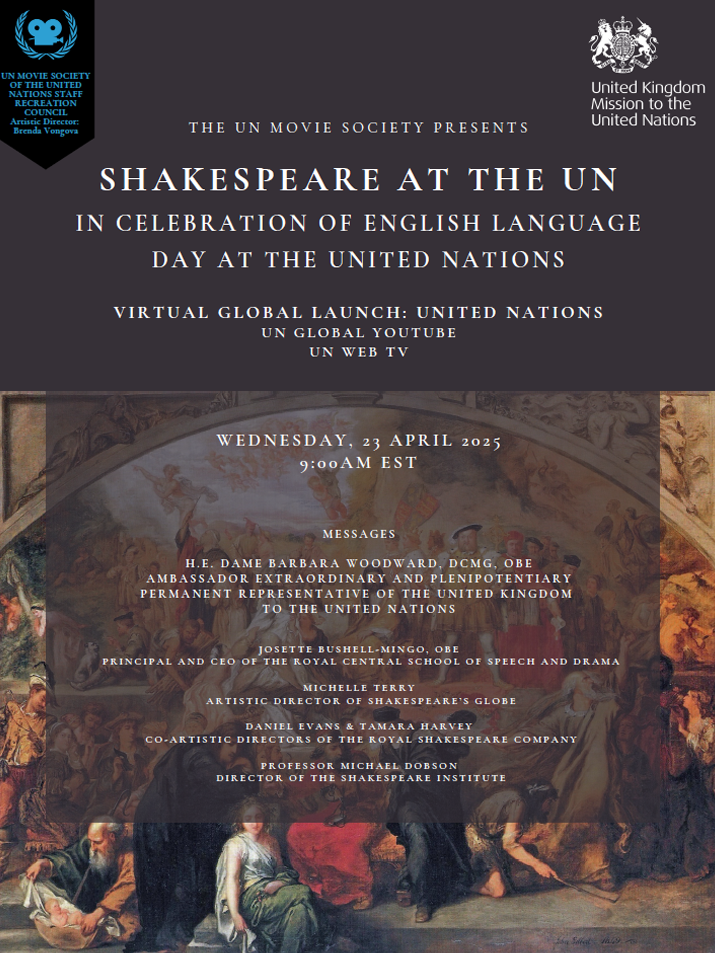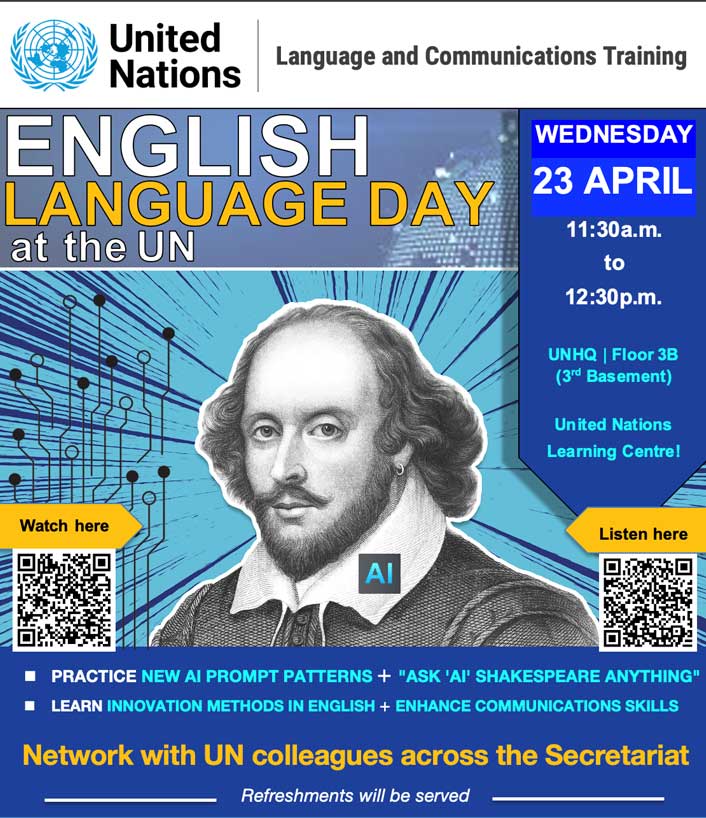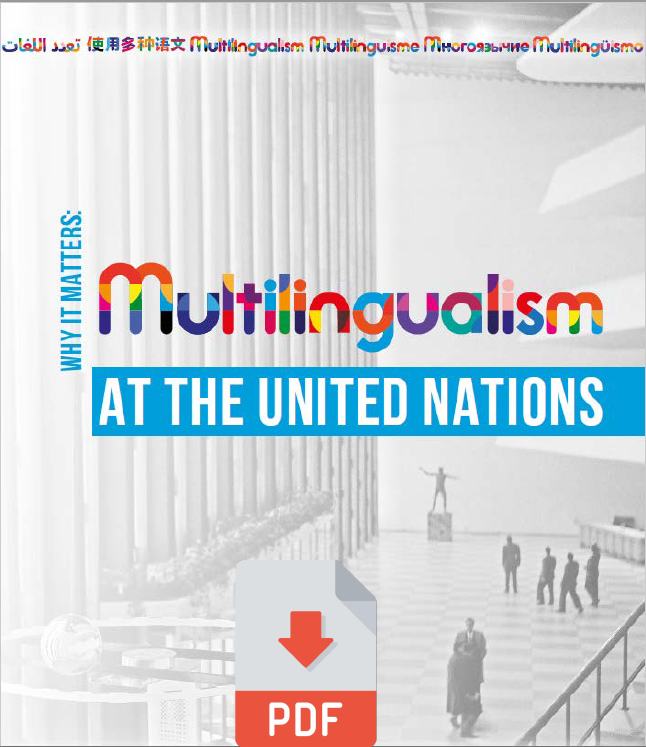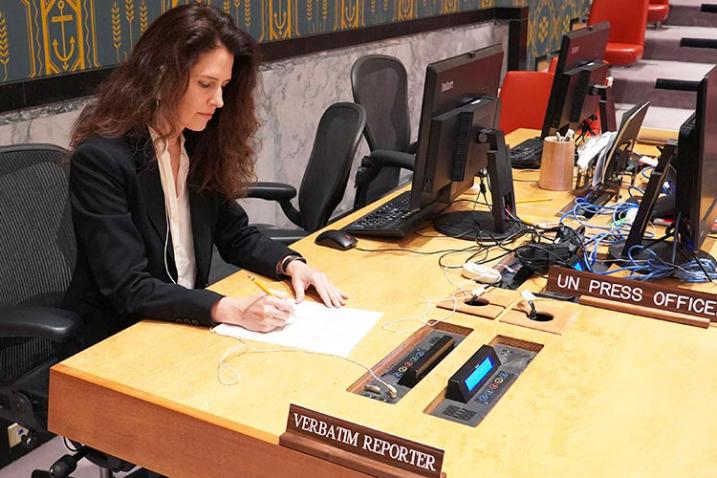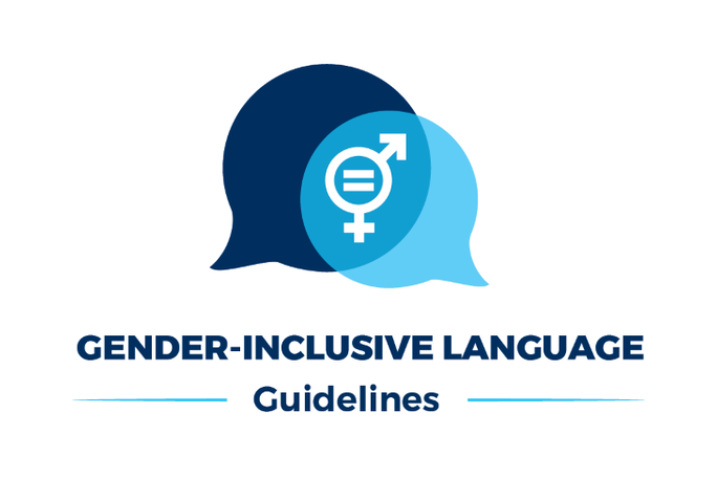Though this be madness, yet there is method in ’t.
William Shakespeare, "Hamlet"
Celebrating the English language at the United Nations
English Language Day at the United Nations is celebrated on the 23rd of April — the date traditionally observed as both the birthday and date of death of William Shakespeare. As well as being the English language's most famous playwright, Shakespeare had a significant impact on modern-day English. Shakespeare's creativity with language meant he contributed hundreds of new words and phrases: 'gossip'; 'fashionable' and 'lonely' were all first used by Shakespeare. He also invented phrases like 'break the ice', 'faint-hearted' and 'love is blind'.
English is one of the languages of international communication. People from different countries and cultures are increasingly able to communicate with each other in English, even if it is not their first language. This makes it an essential tool for global cooperation and diplomacy.
At the United Nations, English is one of the two working languages, along with French.
Virtual event: Shakespeare at the UN
Date: 23 April 2025
Time: 9:00 a.m. (EST)
Flyer with details of the event [PDF]
Watch on: UN YouTube Channel | UN WEB TV
The UN Movie Society presents Shakespeare at the UN in celebration of the English language day.
What happens when Shakespeare meets AI at UNHQ?
Date: 23 April 2025
Time: 11:30 a.m. - 12:30 p.m. (EST)
Place: The Lighthouse in the UNHQ Learning Centre (Third basement -- floor 3B)
Sign up - space is limited: Register for the event - open to UNHQ pass holders
Join us at the "UNHQ English Language Day: Upskilling ‘AI’ Innovation from Classroom to Global Workplace," a special “innovative showcase” to gain a set of ready-to-implement skills for innovating your communications. Learn from our "Ask 'AI' Shakespeare Anything” & more.
Presented by the UNHQ English Language and Communications Programme as part of Capacity Development and Operational Training Service (CDOTS).
Language days at the UN
English Language Day is the result of a 2010 initiative by the UN's Department of Global Communications, establishing language days for each of the Organization's six official languages. The purpose of the UN's language days is to celebrate multilingualism and cultural diversity, and to promote equal use of all six official languages throughout the Organization.
Under the initiative, UN duty stations around the world celebrate six separate days, each dedicated to one of the Organization's six official languages. With the goal of increasing awareness and respect for the history, culture and achievements of each of the six working languages among the UN community, Language Days at the UN aim to entertain, as well as to inform.
Six Language Days:
Multilingualism and the UN
An essential factor in harmonious communication among peoples, multilingualism is of particular importance to the United Nations. By promoting tolerance, multilingualism ensures effective and increased participation of all in the Organization’s work, as well as greater effectiveness, better outcomes and more involvement.
The balance among the six official languages has been an ongoing concern of the Secretary-General. From 1946 to the present, numerous activities have been undertaken to promote the use of the official languages, and to ensure that the United Nations, its goals and actions, are understood by the widest possible public.
In its resolution of 6 December 1999 (A/RES/54/64), the General Assembly invited the appointment of a senior Secretariat official to serve as coordinator of questions relating to multilingualism.
Multilingualism is a Core Value of the United Nations - UN Secretary-General António Guterres
Multilingualism and the United Nations - One world, many languages
Test your knowledge - level 1

Modified Adobe Express/AI generated illustration
Test your knowledge - level 2

Adobe Express/AI generated illustration
UN English Language Programme
The English Language Programme (ELP) offers regular core English courses (levels one through eight), which are designed to improve general English language proficiency, as well as communication courses and special courses to meet both the work-related needs and cultural interests of members of the United Nations community.
UN Strategic Framework on Multilingualism
Strategic Framework [pdf]:
Arabic | Chinese | English | French | Russian | Spanish
Multilingualism at the UN: Why it matters
English Language Day 2025 (UNIFIL)
Resources
- Multilingualism at the UN (including the United Nations Strategic Framework on Multilingualism)
- Coordination of multilingualism
- United Nations Editorial Manual
- United Nations Multilingual Terminology Database (UNTERM)
- Competitive examinations for language professionals
- Language Learning at the UN
- Language proficiency examination
- Dag Hammarskjöld Library
- UNOG Library Research Guide on Multilingualism
- UN Digital Library
- UN Social Media accounts #EnglishLanguageDay



